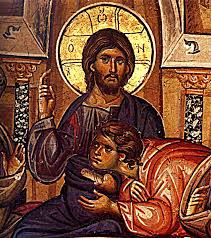19 February OS 2016 – Thursday of Meatfare Week; Holy Apostles Archippus and Philemon, Holy Martyr Apphia
Today’s reading from the Apostolos is I John 4:20 – 5:21. At one point, the Beloved Disciple writes as follows:
For this is the love of God, that we keep his commandments: and his commandments are not grievous. For whatsoever is born of God overcometh the world: and this is the victory that overcometh the world, even our faith. Who is he that overcometh the world, but he that believeth that Jesus is the Son of God (I John 5: 3-5)?
St. Theophan the Recluse, in commenting on this passage, speaks of the victory of Faith in overcoming the love of the world:
“This is the victory that overcometh the world, even our Faith (I John 5:4) – the Christian Faith – To overcome the world – what does this mean? Not to exterminate all those who love the world, or to annihilate and destroy all which is loved by the world. It means rather that while living amidst those who love the world and moving amidst customs loved by the world, we should live as ones alien to everyone and everything. As soon as you have rejected the world and everything worldly, you have by this very action overcome the world. But what teaches you to reject the world and what gives you strength for this? Our [i.e., the Orthodox] Faith. It discloses the destructiveness of the delusions of the world and inspires the desire to free oneself of their nets. Then, when one resolves to break these bonds, when one repents and approaches the Mysteries of Renewal – Baptism or Repentance – faith allows him to mystically feel the sweetness of a life opposed to the world, a sweetness with which all the pleasures of the world cannot in any way enter into comparison. As a result, a loathing for everything worldly dwells in the heart, which is actually victory over the world. But in this mystical action, as a result of which loathing for the world is born, the power to abide steadfastly in this loathing and alienation from the world is also granted; and this is a decisive and lasting victory. – Thoughts for Each Day of the Year, pp. 46-47
Most Orthodox Christians, though formally adherents of an otherworldly Faith, turn to an otherworldly frame of mind only when they have been disappointed in this life. Things are not going their way – family problems, health problems, financial worries, etc. – and they begin to think, “Well, perhaps this life is not all there is. I need to look elsewhere for some kind of happiness that won’t go away.” This thought, that one’s real life is elsewhere, should console one greatly, for it implies that life’s troubles have an end, and that one does not have to solve them all, which is, after all, humanly impossible. This thought gives one hope, and one begins to realize that otherworldliness is a normal and happy frame of mind. It is the only way of looking at life that makes sense.
When we have this realization, however, we have to seize on it and do something about it, for the love of this world usually comes back strong as soon as worldly matters begin to go even a little bit well for us. We must establish a prayerful and vigilant life. We must, as St. Theophan says, abide steadfastly in this loathing and alienation from the world; we have to live as exiles and pilgrims passing through a foreign land. We acquire this mental abiding through doing God’s commandments, which hurts at first, because we are so worldly, but become very sweet to us after awhile, so that we cannot imagine living without them. As the Theologian says, “…His commandments are not grievous.”
As Great Lent approaches, let us ask the Lord to give us just a little whiff of the fragrance of Paradise, our true home, to motivate us to undertake the struggle of prayer and fasting. Orthodoxy is so beautiful, and we make the effort to enjoy so little of it! We need to ask fervently for the grace of the divine eros, the love and longing for that which is most lovable, that which is infinitely lovable, which is God Himself. Human beings were made to love, and the need to do so is insatiable, until it is satiated with God. When we put Him first, then all of our lesser loves make sense; they become transfigured by the love of God and are transformed from idols into means of grace.

